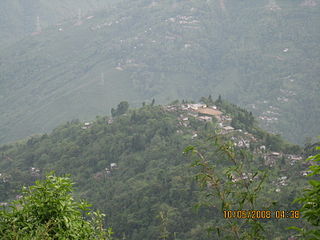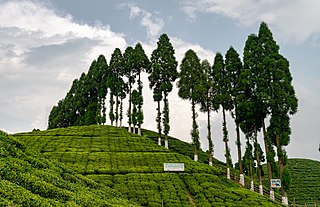Jorebungalow is a village in the Jorebunglow Sukhiapokhri CD block in the Darjeeling Sadar subdivision of the Darjeeling district in the Indian state of West Bengal.
Pokhriabong is a village in the Jorebunglow Sukhiapokri CD block in the Darjeeling Sadar subdivision of the Darjeeling district in West Bengal, India.

Sukhia Pokhri is a census town in the Jorebunglow Sukhiapokhri CD block in the Darjeeling Sadar subdivision of the Darjeeling district in the indian state of West Bengal. It is located 11 km from Ghum on the way to Mirik.

Soureni is a village in the Mirik CD block in the Mirik subdivision of the Darjeeling district, in West Bengal, India.

Avongrove Tea Estate is a tea garden in the Mirik CD block in the Mirik subdivision of the Darjeeling district in West Bengal, India.

Poobong Tea Garden is a village in the Jorebunglow Sukhiapokhri CD block in the Darjeeling Sadar subdivision of the Darjeeling district in West Bengal, India.

Sonada is a census town in the Jorebunglow Sukhiapokhri CD block in the Darjeeling Sadar subdivision of the Darjeeling District in West Bengal, India.

Panighatta, or Panighata, is a Tea Estate village on the banks of Balason River and the foothills of the Himalayan Mountains. Panighatta falls under the Mirik sub-division of Darjeeling district and is situated about 26 kilometers from Mirik and 32 km from Siliguri in the state of West Bengal in India.
Rongmook Ceder Tea Garden is a census town in the Jorebunglow Sukhiapokhri CD block in the Darjeeling Sadar subdivision of the Darjeeling district in the state of West Bengal, India.
Mangarjung Tea Garden (Nagri) is a census town in the Jorebunglow Sukhiapokhri CD block in the Darjeeling Sadar subdivision of the Darjeeling district in the state of West Bengal, India.

Gopaldhara Tea Estate is a tea garden in the Mirik CD block in the Mirik subdivision of the Darjeeling district in the Indian state of West Bengal.
Thubro Tea Estate is a tea garden in the Mirik CD block in the Mirik subdivision of the Darjeeling district in the Indian state of West Bengal.
Okayti Tea Estate is a tea garden in the Mirik CD block in the Mirik subdivision of the Darjeeling district in the Indian state of West Bengal.
Mariabong Tea Garden is a village in the Jorebunglow Sukhiapokhri CD block in the Darjeeling Sadar subdivision of the Darjeeling district in the state of West Bengal, India. It is a part of Lingia Mariabong gram panchayat.
Sungma Tea Garden is spread over two villages - Sangmaru Tea Garden (Sungma) and Tarzun Tea Garden in the Jorebunglow Sukhiapokhri CD block in the Darjeeling Sadar subdivision of the Darjeeling district in the state of West Bengal, India.
Tumsong Tea Garden is a village in the Jorebunglow Sukhiapokhri CD block in the Darjeeling Sadar subdivision of the Darjeeling district in the state of West Bengal, India.
Singbulli Tea Garden is a village in the Mirik CD block in the Mirik subdivision of the Darjeeling district in the state of West Bengal, India.
Phuguri Tea Estate is a tea garden in the Mirik CD block in the Mirik subdivision of the Darjeeling district in the Indian state of West Bengal.
Chamong Tea Garden is a village in the Jorebunglow Sukhiapokhri CD block in the Darjeeling Sadar subdivision of the Darjeeling district in the state of West Bengal, India.
Nagri Farm Tea Garden is a village in the Jorebunglow Sukhiapokhri CD block in the Darjeeling Sadar subdivision of the Darjeeling district in the state of West Bengal, India.









